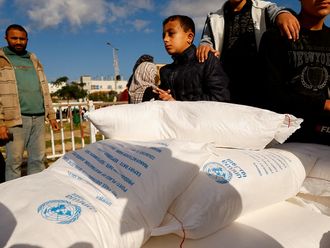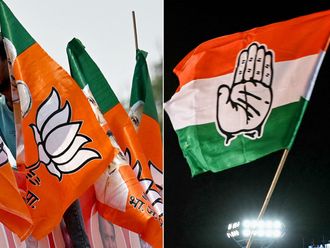The decisions of the Copenhagen UN Summit on climate change and the fate of the earth threatened by environmentally harmful green house gas emissions — resemble the decisions of the Arab League.
Both decisions are in a gray area and cannot be explained or implemented after the end of the meeting.
Although the Copenhagen meeting took two weeks, and was considered the most important global meeting since the end of the Second World War, discussions were limited to environmental aspects.
These environmental issues were the subject of disagreements between all parties, yet there are economic consequences of climate change, which are no less important than the environmental ones.
Devastation
Climate change over the last few decades has led to floods, drought, desertification and storms, which have left massive devastation in agricultural lands, especially in poor countries that depend on agriculture. This has left millions of farmers homeless and caused famine in many developing countries.
Besides failing to give these issues the importance they deserve, the meeting came out with hazy non-obliging decisions for any country.
The first decision, that the increase in global temperatures should be limited to two Celsius degrees compared with pre-industrial times, was left floating with no mechanism for implementation.
The allocation of $1 billion (Dh3.67 billion) in 2012 and $100 billion from 2020 was also soft and undefined, just like the Arab League's decisions over the past 60 years, none of which were implemented.
This hazy situation happened due to marginalising of the role of Europe, which was in charge of issuing global legislations in the past decades.
The final Copenhagen agreements were concluded between the US, China, India, Brazil and South Africa, considering that the US and China have the highest level of polluting gas emissions in the world.
Hence, neither Washington nor Beijing intend to make big concessions and this is for purely economic considerations.
The US does not want to abandon its habit of over consumption and dependence on oil despite the huge damage that the 14 million barrels of daily oil imports does to its balance of trade.
As for China, its economic ambitions and the expectation for it to become the world's second largest economy in 2010, as well as its attempts to catch up with the US economy, make it careless about climatic change.
China has a development programme and ambitions to become the world's leading economy in the next three decades.
Deterioration
Meanwhile, confused Europe, which is concerned about containing the climatic deterioration that affects huge parts of it, was not able to do a lot.
The representatives of some European countries took a nap during discussions, especially the representatives of Mediterranean countries, who are used to taking a siesta.
In addition, developing countries, including Arab exporters of raw materials, appeared as confused as Europe.
They voiced some remarks about the attempts of European Union countries to reduce gas emissions through reducing the dependency of fossil fuel.
This issue is especially important for Arabian Gulf countries, whose economies are based on oil and gas at a time when there are serious attempts to reduce their share in the global power balance.
This issue is a priority for EU countries, which work in many directions, whether by imposing huge taxes on the use of hydrocarbon power or by finding alternative sources through reducing production costs of these alternatives, especially solar, wind and nuclear energy.
This tendency poses a big challenge to oil-producing countries, which must have their programme and vision for the next climate summit in Mexico next year.
It is expected that concerned countries will overcome obstacles faced during the Copenhagen Summit and reach a minimum level of coordination, especially that the administration of US President Barack Obama and his Democratic Party support cutting down reliance on hydrocarbon power.
Arab countries must chart their vision for the relationship between attempts to cut the world's reliance on oil, and their oil-reliant economies. This discussion could be facilitated through the Organisation of Oil Exporting Countries (Opec).
This would give such vision or strategy a global dimension that serves the interest of oil-producing countries.
Dr Mohammad Al Asoomi is a UAE economic expert









